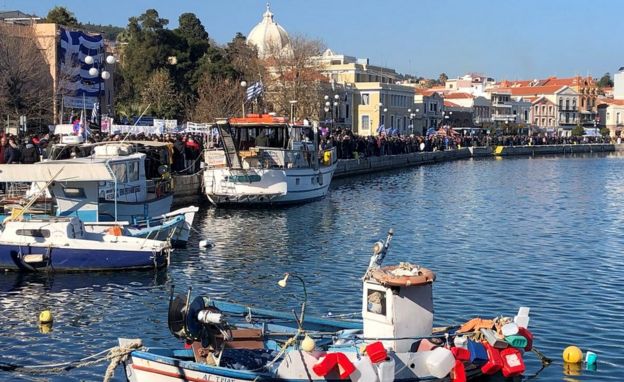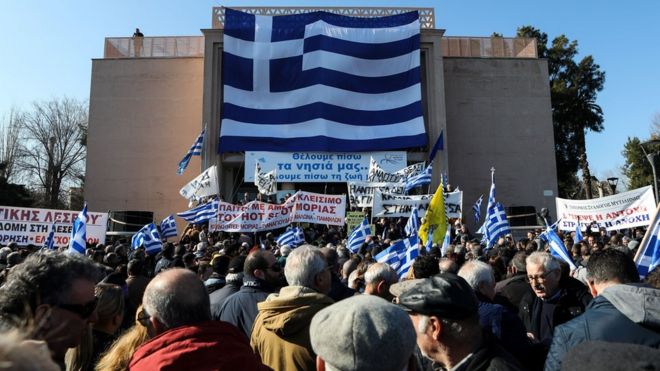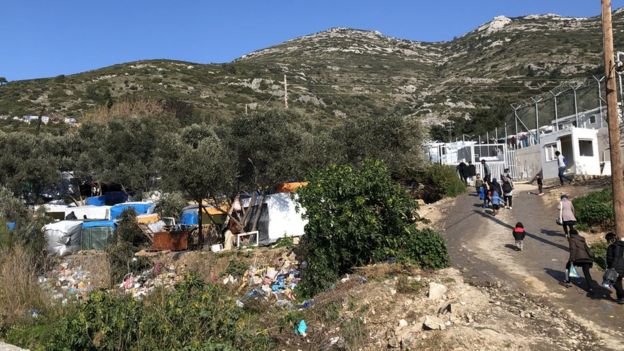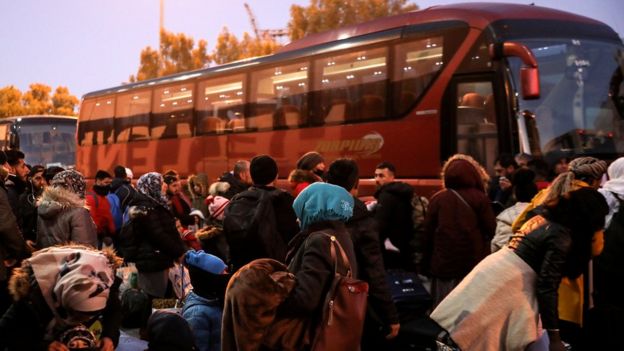Bearing the Brunt of the Middle East's Dysfunction
"Lots of people have come [as migrant refugees to Europe through Greece]. I have been here [on Samos] the longest."
"I've lost hope that they [authorities] will say my name [to be interviewed and allowed to enter the mainland to declare refugee status]."
Ashaq Hossein, 25, Afghani migrant
"[There are two ways to curb migration to the islands]: First, more efficient guarding of our borders and, second, the immediate return of those who don't deserve international protection."
Migration and Asylum Minister Notis Mitarakis
 |
| Feelings are running high on the five Aegean islands, which are home to more than 41,000 migrants |
"Here it's like a prison. The migrants aren't allowed to leave the island. They aren't free to go where they like."
"In Samos town there are more of them than us. They are different. They change our culture."
"Samos town was full of tourists before. Many people I know, from England too, they say they won't come to the town."
Georgios, Greek bartender
"I saved people in the past and if necessary, I would do it again now. When human lives are in danger, we have to protect them."
"But we want the refugees and the immigrants to go to another place, to Greece or other parts of the EU. More people are coming and just staying on our islands. They live in tents in inhuman conditions."
Mayor Giorgos Stantzos, East Samos
 |
| Protesters in Lesbos stand in front of a Greek flag and a banner that reads: "We want our islands back, we want our lives back." Reuters |
The island of Samos, a place of ancient ruins, fishing villages, muscat wine, the birthplace of the goddess Hera and the philosopher Epicurus is now host to migrant camps and a tent city. The island has a population of about 6,200 locals, and on that fabled island Greek citizens involuntarily now share their island home with 6,800 foreign migrants who live in desperate conditions. Greece did not invite these visitors; they took it upon themselves to escape their own ancestral towns and villages where violence and oppression reign, in favour of seeking refuge in Europe.
The influx of refugees has been unstoppable since 2015, flooding Europe with millions escaping conflict, poverty and the dysfunction of their mostly Islamic homelands. They arrive with the baggage of Islam and a culture that fails to lend itself to integration with that of the indigenous heritage and culture, a jarring entry of imposition angering residents who, while not averse to aiding small numbers of refugees, are aghast at the need to somehow cope with uninvited guests whose huge presence is beyond troubling.
 |
| Migrants live in tents at the camp on the Greek island of Samos |
The Greek government is under immense stress, beyond its ability to cope in the face of the European Union's lack of sympathy for their plight; one echoed in varying measure across Europe. Ongoing dysfunctional chaos and conflict in the Middle East and Turkey's malign manipulative relations with Europe has seen to it that desperate people leave their homes, their countries of birth, hoping that gambling with their lives through dangerous migrant routes will somehow offer them a link to a better future for themselves and their families. But the flood they represent is suffocating Europe.
And so they wait for permission to leave the islands of Lesbos. Chios, Leros, Kos and Samos for the Greek mainland where their hopes of assuming new lives in Europe sustain them under desperate living conditions. Where, living in crowded camps or in insubstantial tents they take to looting summer cottages of household goods to sustain themselves; mattresses, blankets, pots, windows, doors, even walls and roofs to help construct something more substantial to shield themselves from the weather.
 |
| Two young men cover their shelter with plastic sheets at a makeshift camp in Moria, Lesbos Getty Images |
Town residents are not without sympathy for the plight of the migrants. Georgios Stantzos had volunteered to rescue asylum seekers, to recover bodies when the migrant crisis was at its 2015 height, but even he finds himself drained of empathy, lashing out at the presence of migrants loitering the main square of his town. His pleas toward the government for assistance as riots took place in the camp came to nothing. Police fired tear gas on migrants protesting their living conditions.
Built initially to hold 648 people, the camp now holds over 3,000. There is no medical care available, and people live in primitive conditions. Even so, those in the camp live in conditions superior to those living in tents. Refugees from Syria are given preferential treatment to the extent that their opportunities to be allowed to travel to the mainland and declare refugee status is favoured; others languish, ignored. If one group is given priority, the others wait in vain.
Among the migrants are close to 2,000 children, 351 of them unaccompanied minors and 580 infants and toddlers. Mayor Stantzos pleaded with the Greek authorities, and they promised the camp would close and with that promise he gave his support for the establishment of a temporary new camp meant to hold 1,500 migrants five kilometers inland from town. Later, he heard the camp would be built to accommodate 7,000. "I feel betrayed", he said, speculating that the real number would be 15,000.
 |
| A number of migrants arrived on the Greek mainland recently from Lesbos Reuters |
Labels: Chaos, Greece, Lesbos, Refugee Camps, Refugees, Samos
0 Comments:
Post a Comment
<< Home